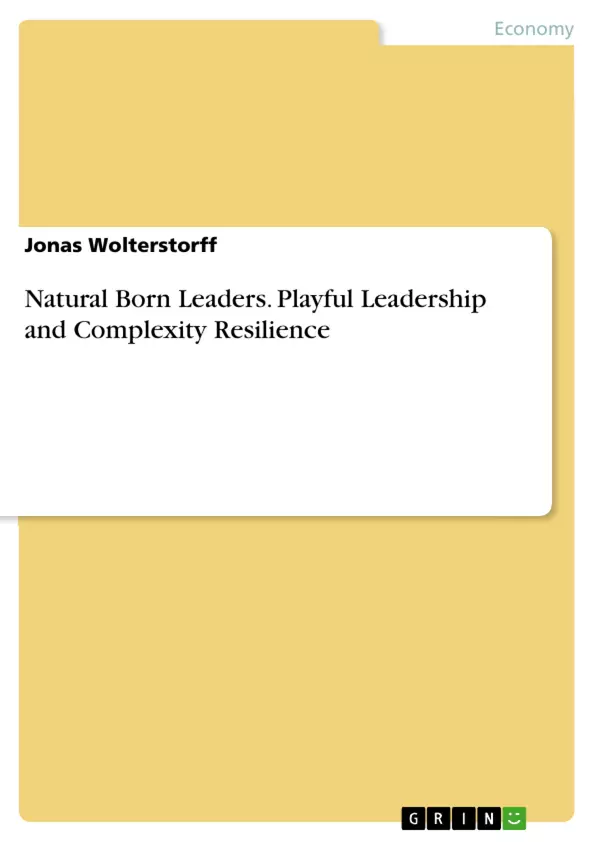With increasing complexity of the known world, companies and individuals struggle more and more to understand how they can take part and what their role is. This especially applies to the CEOs and Executives of the corporate industry that slowly have to acknowledge that their old models do not work as well anymore.
In this paper, the author looks at the meaning of play and how children can be powerful role models to adjust our way of doing business. A case study and personal reflection this work brings this work to culmination.
Inhaltsverzeichnis (Table of Contents)
- A. Literature Review: Leadership & Environmental Ethics
- 1. Leadership
- a. Status Quo Leadership & Conventional Leaders
- b. Alternative Models of Leadership
- i) Spiritual Leadership
- ii) Adaptive Leadership
- 2. Ethics
- a. Stewardship Theory of Management
- b. What are Ethics?
- c. Hattingh's Environmental Ethics Typology
- i) Criticism of Hattingh's typology
- d. Worldview's Typology
- e. Applying the worldview Typology to (Environmental) Ethics
- 3. Bringing the threads together: Worldviews, Ethics & Leadership...
- B. Personal Case Study: Who am I? What kind of Leader do I want to be(come)?
- 1. Heading a Start-up that Creates Societal Change and Inspires Individual Behaviour Change
- 2. Learning from the “Best” – Children as Role Models for “Playful Leadership”
- a. Flow - Playfulness & Creativity
- b. Born as Leaders
- c. Entrepreneurship & Frugal Innovation
- d. Intuition - Giving voice to immersive, holistic Beings
- e. Conscious Irrationality – Being aware of the Rationality Myth
- f. Forgiveness & Vulnerability - “Failure is Just a Way of Learning”
- g. Ecological Empathy: Biophilia & Ecological Literacy
- h. Further research potential with regards to children's leadership potential...
- 3. “Playful Leadership” -Pitfalls & Redemption
- a. Pitfalls
- i) Recklessness
- ii) Childishness
- b. Redemption
- i) Complex Systems & Adaptation
- ii) Reiteration
- iii) Trust
- C. Playful Leadership in Practice
- 1. Meet “Project 90 for 2030”
- 2. Interview with Tina Schubert...
- 3. Principles of Playful Leadership visible at P90
- D. Conclusion
- The limitations of conventional leadership models in a complex and changing world.
- The role of ethics and worldviews in shaping leadership approaches.
- The potential of "Playful Leadership" inspired by children's inherent qualities.
- The application of playful leadership principles in practical projects promoting sustainability.
- The challenges and opportunities of integrating complexity and adaptation into leadership practices.
Zielsetzung und Themenschwerpunkte (Objectives and Key Themes)
This text explores the concept of playful leadership, drawing inspiration from children's inherent leadership qualities and applying them to the field of environmental ethics and sustainability. It aims to challenge traditional models of leadership and propose a new paradigm that emphasizes complexity, adaptability, and an ethical approach to environmental stewardship.
Zusammenfassung der Kapitel (Chapter Summaries)
The "Literature Review" section examines the historical development and current trends in leadership theory, highlighting the shortcomings of conventional, command-and-control leadership models. It introduces alternative approaches like spiritual and adaptive leadership, emphasizing their relevance to navigating complex and uncertain environments. Additionally, the chapter explores the concepts of environmental ethics and their relationship to leadership practices.
The "Personal Case Study" delves into the author's personal journey and reflections on their own leadership aspirations. It highlights the importance of personal growth, self-awareness, and the role models that inspire the development of a unique leadership style. The chapter explores the author's interest in "Playful Leadership" inspired by children's inherent qualities of creativity, adaptability, and resilience.
The "Playful Leadership in Practice" section explores the concrete application of playful leadership principles in a real-world project. The author introduces a case study focusing on Project 90 for 2030, a project designed to promote sustainability and positive societal change. This section analyzes the key elements of playful leadership, emphasizing its effectiveness in fostering collaboration, innovation, and a sense of shared purpose.
Schlüsselwörter (Keywords)
This text focuses on the intersection of leadership, environmental ethics, and sustainability, exploring the concepts of "Playful Leadership," "Adaptive Leadership," "Complex Systems," "Environmental Ethics," and "Sustainable Development." It investigates the potential of drawing inspiration from children's inherent qualities to foster ethical and adaptable leadership practices, ultimately contributing to a more sustainable and just future.
Frequently Asked Questions
What is 'Playful Leadership'?
It is a leadership model that draws inspiration from children's natural qualities like creativity, flow, and resilience to navigate complex modern business environments.
How can children be role models for executives?
Children exhibit 'frugal innovation', intuition, and a healthy approach to failure ('failure is just a way of learning'), which are essential for adaptive leadership.
What is the connection between leadership and environmental ethics?
The paper argues that effective leadership requires 'Ecological Empathy' and a worldview that prioritizes environmental stewardship and sustainability.
What are the pitfalls of playful leadership?
Key risks include recklessness and childishness if the 'play' is not balanced with responsibility and systemic understanding.
What is 'Project 90 for 2030'?
It is a case study mentioned in the text that demonstrates how playful leadership principles can be applied to create societal change and inspire sustainable behavior.
- Citar trabajo
- Jonas Wolterstorff (Autor), 2015, Natural Born Leaders. Playful Leadership and Complexity Resilience, Múnich, GRIN Verlag, https://www.grin.com/document/318242



